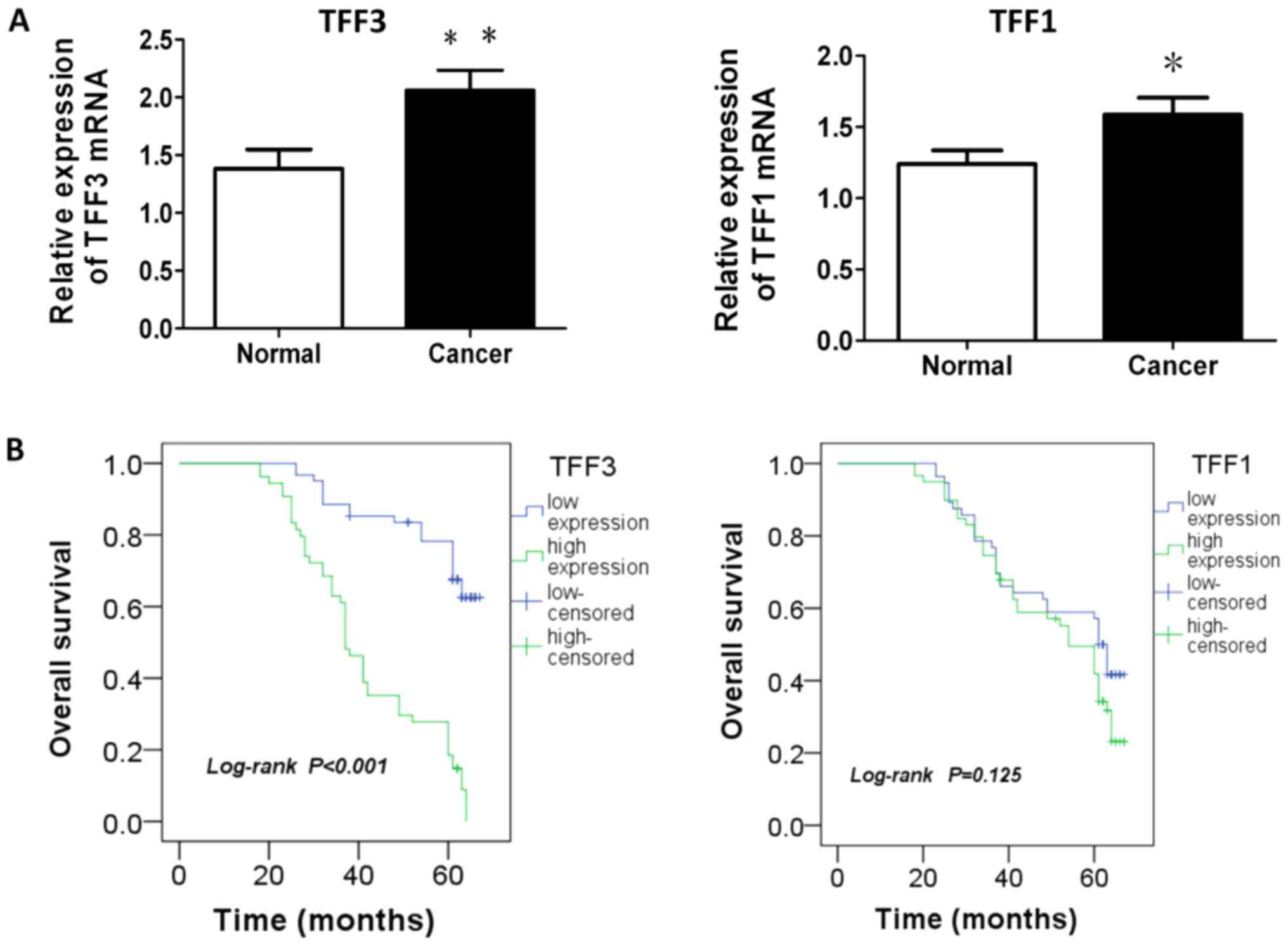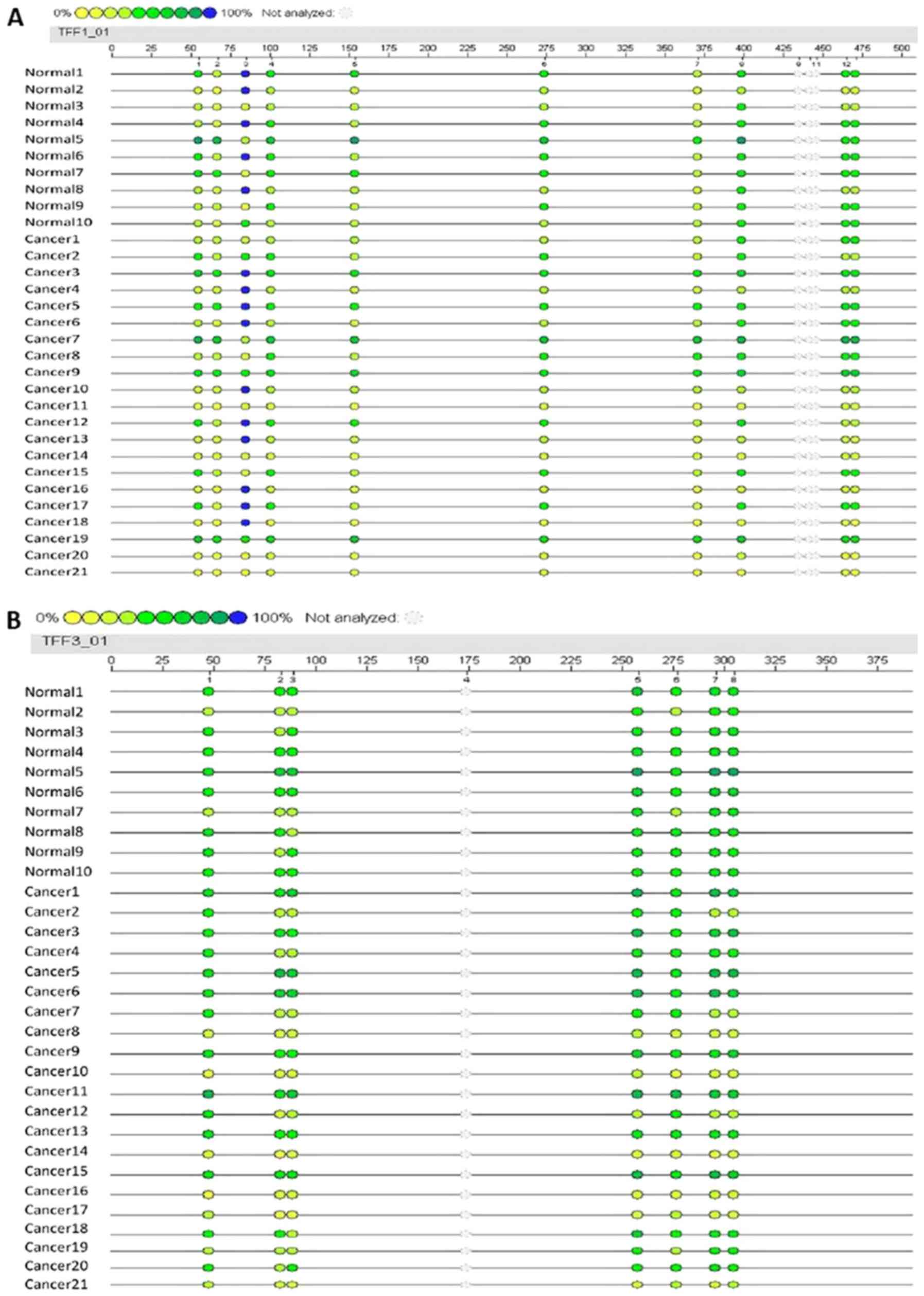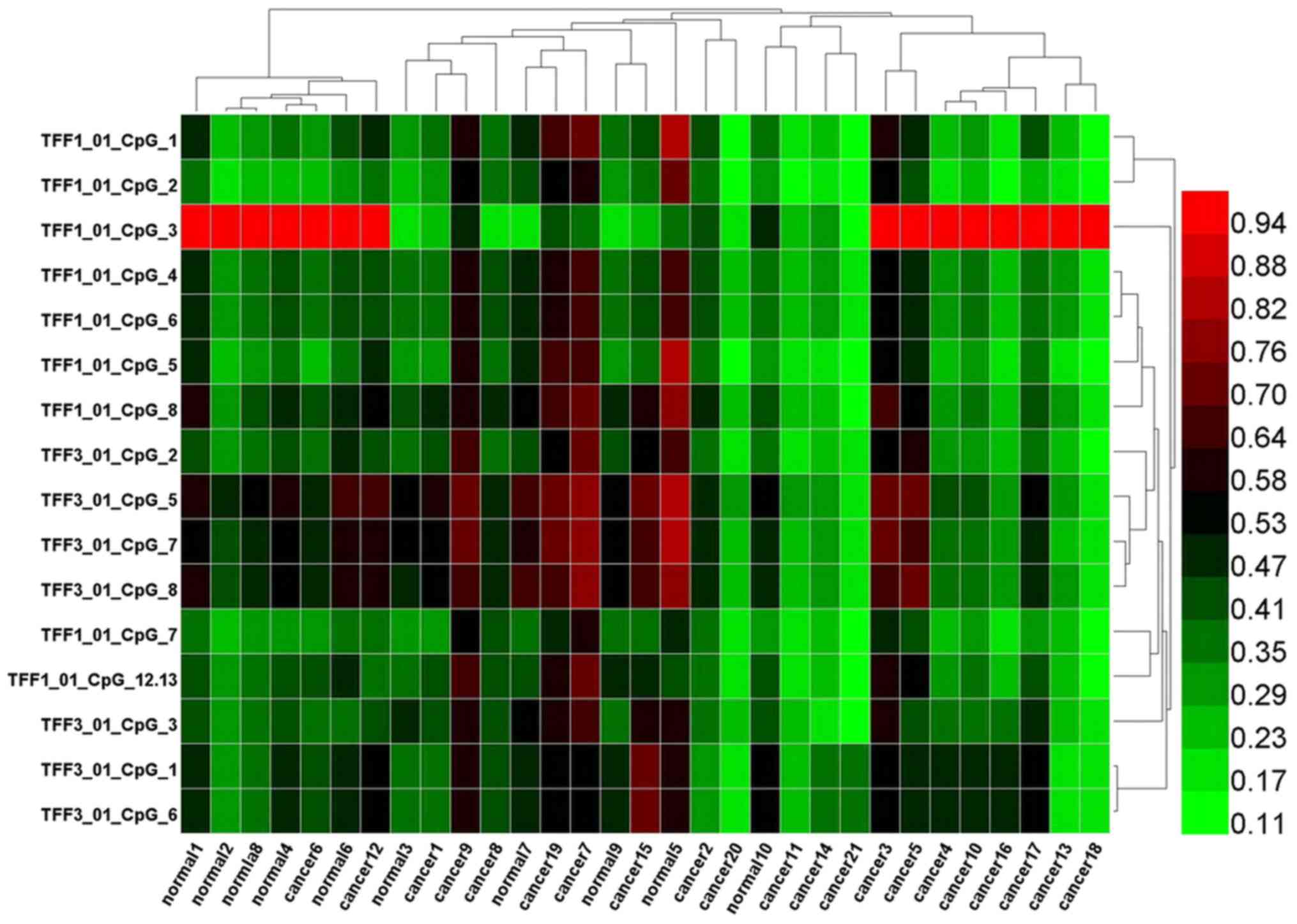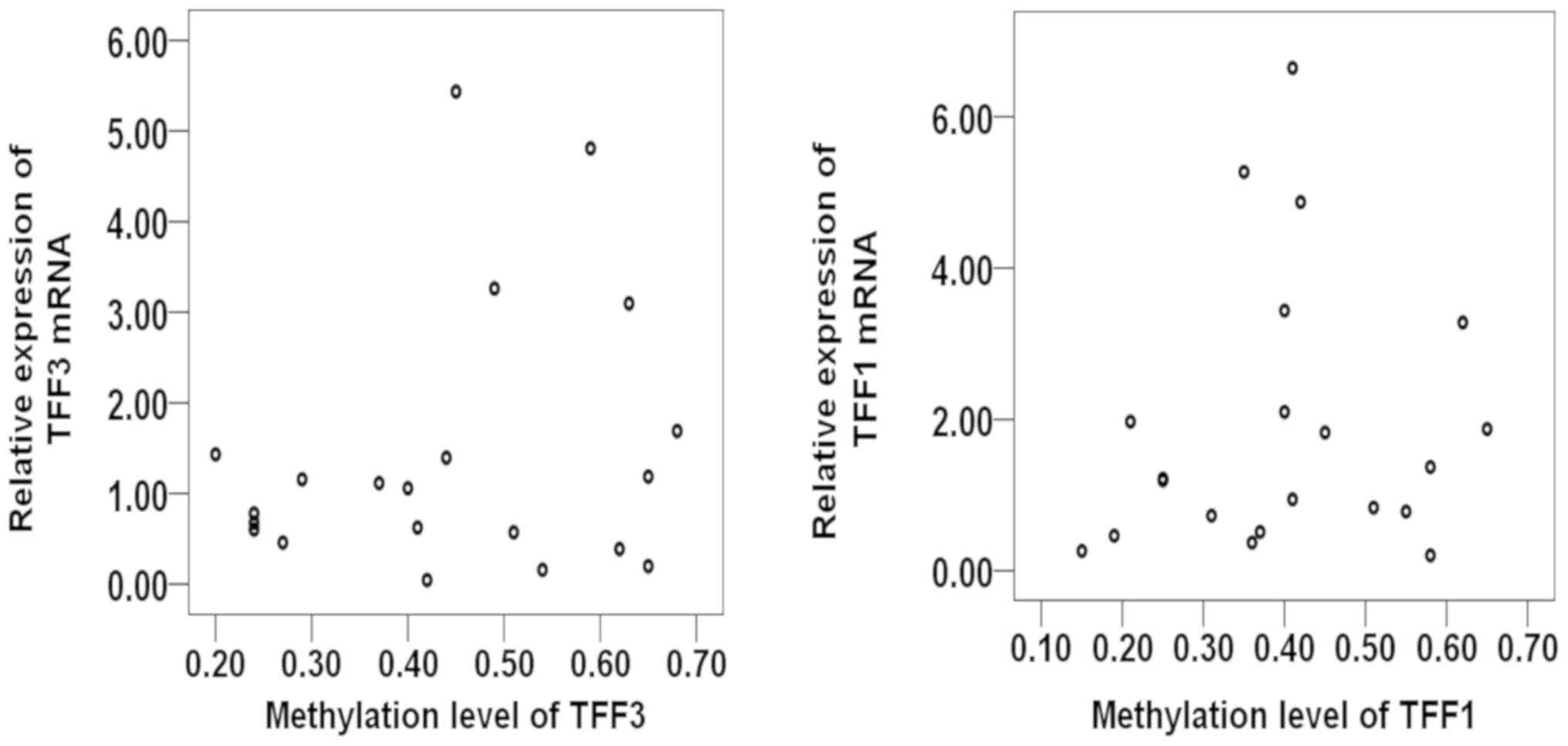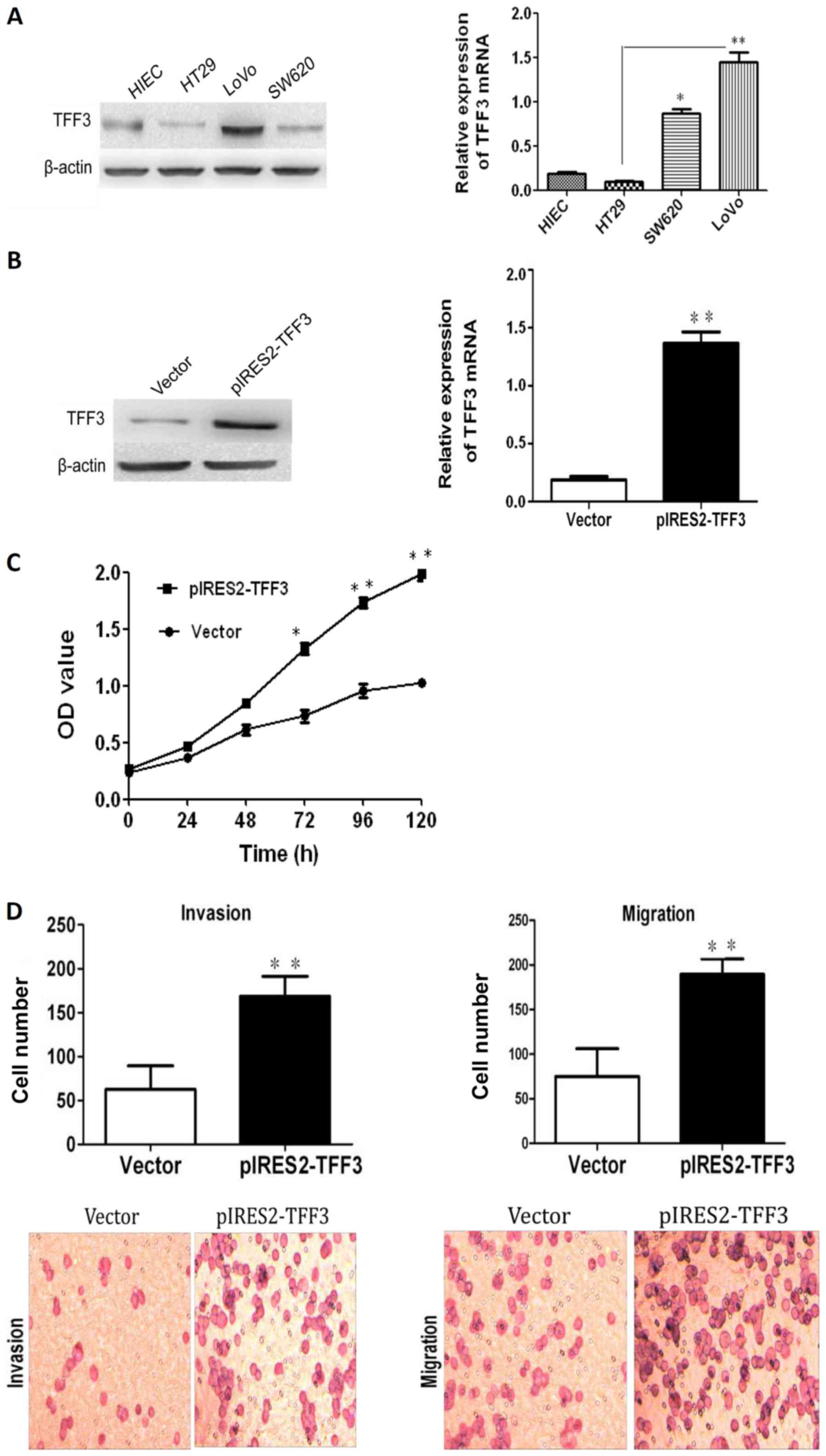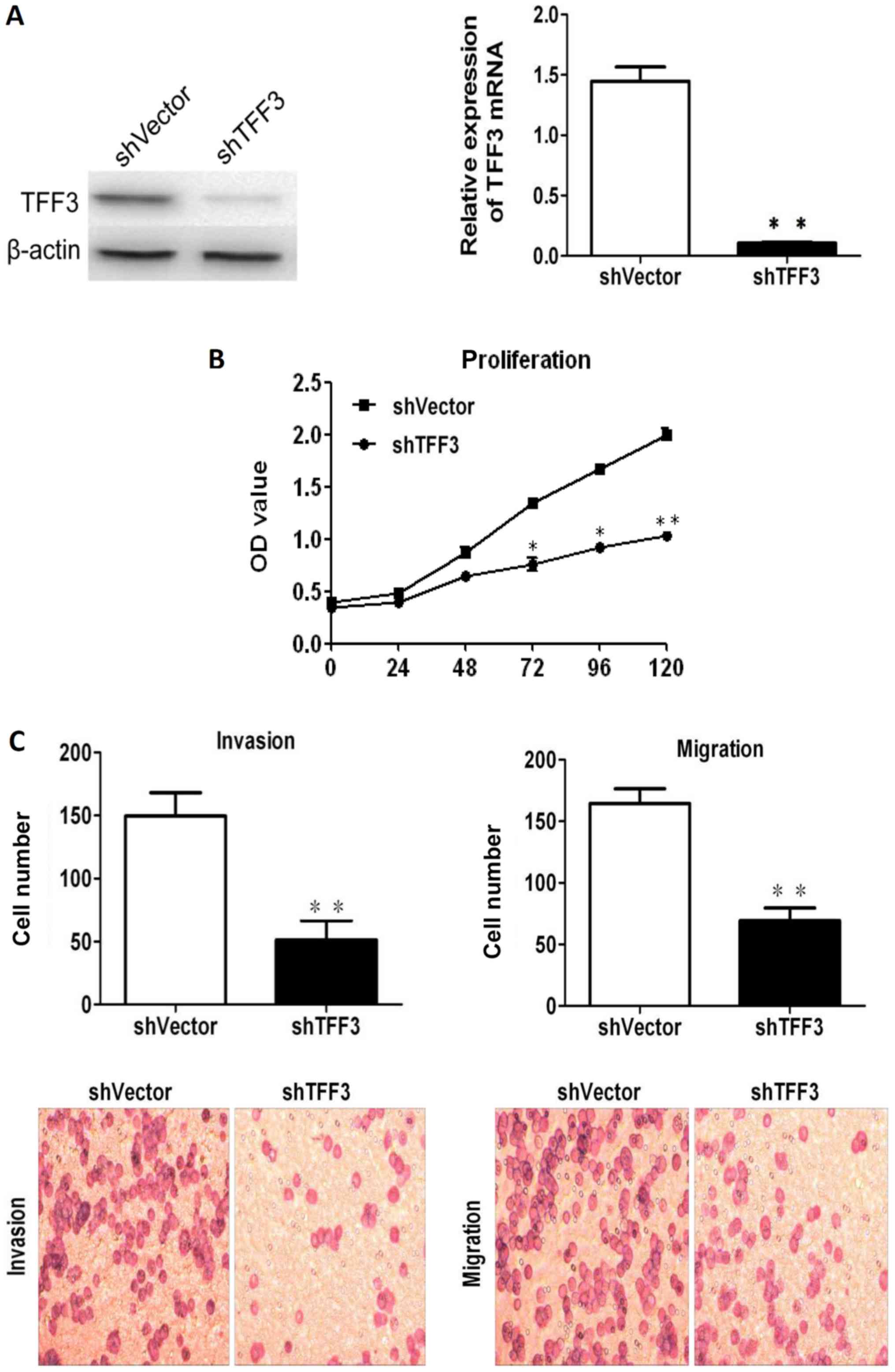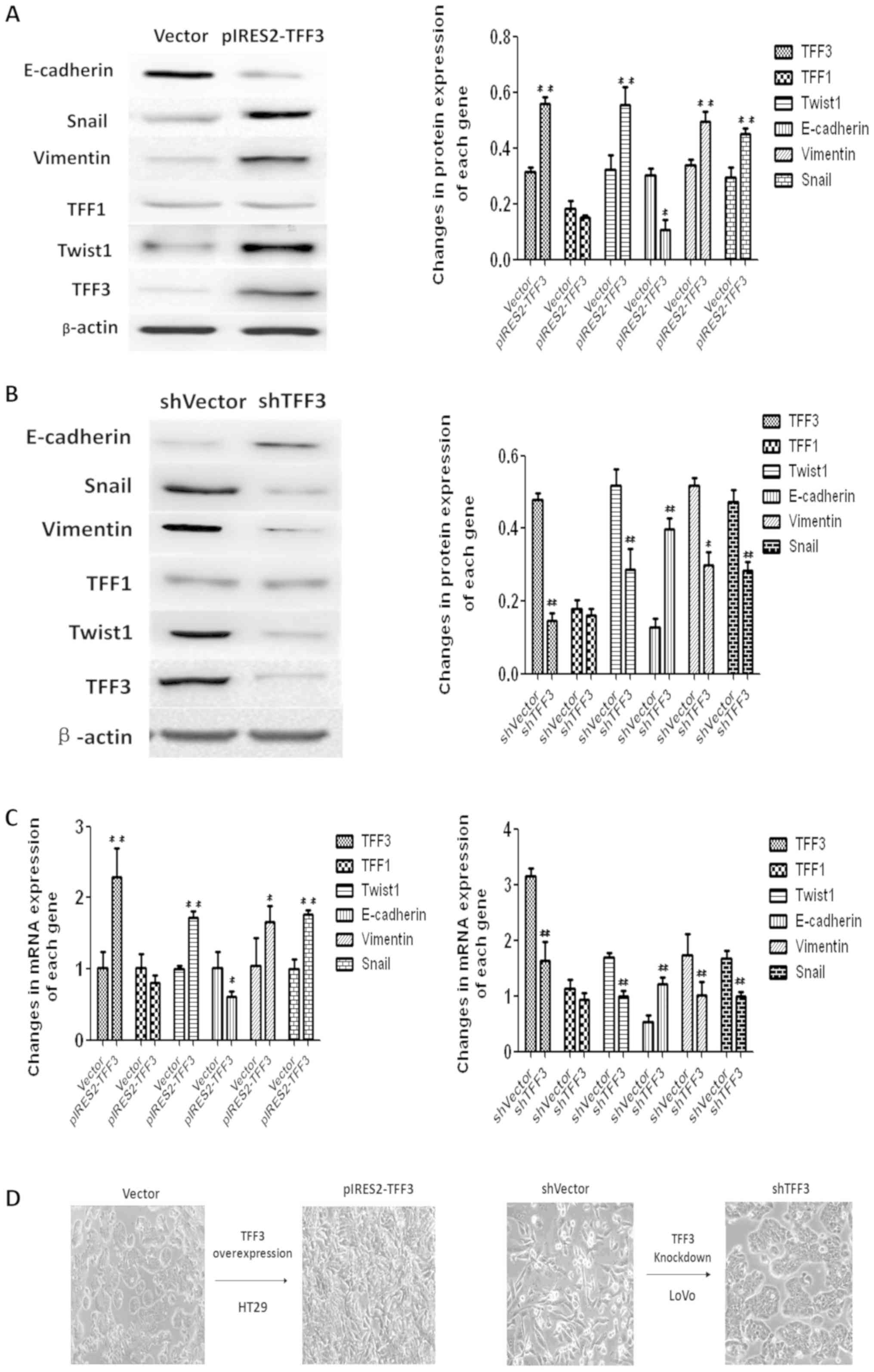|
1
|
Cai SJ and Peng JJ: Colorectal cancer
epidemiology and prevention strategies. In: Proc Academic Annual
Conference of CSCO 2014; pp. 294–301. Peking, China. 2014
|
|
2
|
Li S, Wang J, Lu Y and Fan D: Screening
and early diagnosis of colorectal cancer in China: A 12 year
retrospect (1994 2006). J Cancer Res Clin Oncol. 133:679–686. 2007.
View Article : Google Scholar : PubMed/NCBI
|
|
3
|
Gespach C: Trefoil factors. Encyclopedia
of Cancer. Schwab M: Springer; Berlin, Heidelberg: pp. 4652–4658.
2011
|
|
4
|
Sands BE and Podolsky DK: The trefoil
peptide family. Annu Rev Physiol. 58:253–273. 1996. View Article : Google Scholar : PubMed/NCBI
|
|
5
|
Wright NA, Poulsom R, Stamp G, Van Noorden
S, Sarraf C, Elia G, Ahnen D, Jeffery R, Longcroft J, Pike C, et
al: Trefoil peptide gene expression in gastrointestinal epithelial
cells in inflammatory bowel disease. Gastroenterology. 104:12–20.
1993. View Article : Google Scholar : PubMed/NCBI
|
|
6
|
Regalo G, Wright NA and Machado JC:
Trefoil factors: From ulceration to neoplasia. Cell Mol Life Sci.
62:2910–2915. 2005. View Article : Google Scholar : PubMed/NCBI
|
|
7
|
Hernández C, Santamatilde E, McCreath KJ,
Cervera AM, Díez I, Ortiz Masiá D, Martínez N, Calatayud S,
Esplugues JV and Barrachina MD: Induction of trefoil factor (TFF)1,
TFF2 and TFF3 by hypoxia is mediated by hypoxia inducible factor 1:
Implications for gastric mucosal healing. Br J Pharmacol.
156:262–272. 2009. View Article : Google Scholar
|
|
8
|
Taupin D and Podolsky DK: Trefoil factors:
Initiators of mucosal healing. Nat Rev Mol Cell Biol. 4:7217322003.
View Article : Google Scholar : PubMed/NCBI
|
|
9
|
May FE and Westley BR: Trefoil proteins:
Their role in normal and malignant cells. J Pathol. 183:4–7. 1997.
View Article : Google Scholar : PubMed/NCBI
|
|
10
|
Prest SJ, May FE and Westley BR: The
estrogen-regulated protein, TFF1, stimulates migration of human
breast cancer cells. FASEB J. 16:592–594. 2002. View Article : Google Scholar : PubMed/NCBI
|
|
11
|
Machado JC, Nogueira AM, Carneiro F, Reis
CA and Sobrinho-Simões M: Gastric carcinoma exhibits distinct types
of cell differentiation: An immunohistochemical study of trefoil
peptides (TFF1 and TFF2) and mucins (MUC1, MUC2, MUC5AC, and MUC6).
J Pathol. 190:437–443. 2000. View Article : Google Scholar : PubMed/NCBI
|
|
12
|
Dhar DK, Wang TC, Tabara H, Tonomoto Y,
Maruyama R, Tachibana M, Kubota H and Nagasue N: Expression of
trefoil factor family members correlates with patient prognosis and
neoangiogenesis. Clin Cancer Res. 11:6472–6478. 2005. View Article : Google Scholar : PubMed/NCBI
|
|
13
|
Madsen J, Nielsen O, Tornøe I, Thim L and
Holmskov U: Tissue localization of human trefoil factors 1, 2, and
3. J Histochem Cytochem. 55:505–513. 2007. View Article : Google Scholar : PubMed/NCBI
|
|
14
|
Rodrigues S, Rodrigue CM, Attoub S, Fléjou
JF, Bruyneel E, Bracke M, Emami S and Gespach C: Induction of the
adenoma carcinoma progression and Cdc25A-B phosphatases by the
trefoil factor TFF1 in human colon epithelial cells. Oncogene.
25:6628–6636. 2006. View Article : Google Scholar : PubMed/NCBI
|
|
15
|
Arumugam T, Brandt W, Ramachandran V,
Moore TT, Wang H, May FE, Westley BR, Hwang RF and Logsdon CD:
Trefoil factor 1 stimulates both pancreatic cancer and stellate
cells and increases metastasis. Pancreas. 40:815–822. 2011.
View Article : Google Scholar : PubMed/NCBI
|
|
16
|
Zhao S, Ma Y and Huang X: Trefoil factor 1
elevates the malignant phenotype of mucinous ovarian cancer cell
through Wnt/β catenin signaling. Int J Clin Exp Pathol.
8:10412–10419. 2015.
|
|
17
|
Kannan N, Kang J, Kong X, Tang J, Perry
JK, Mohankumar KM, Miller LD, Liu ET, Mertani HC, Zhu T, et al:
Trefoil factor 3 is oncogenic and mediates anti-estrogen resistance
in human mammary carcinoma. Neoplasia. 12:1041–1053. 2010.
View Article : Google Scholar : PubMed/NCBI
|
|
18
|
Gu J, Zheng L, Zhang L, Chen S, Zhu M, Li
X and Wang Y: TFF3 and HER2 expression and their correlation with
survival in gastric cancer. Tumour Biol. 36:3001–3007. 2015.
View Article : Google Scholar
|
|
19
|
Pandey V, Wu ZS, Zhang M, Li R, Zhang J,
Zhu T and Lobie PE: Trefoil factor 3 promotes metastatic seeding
and predicts poor survival outcome of patients with mammary
carcinoma. Breast Cancer Res. 16:429–448. 2014. View Article : Google Scholar : PubMed/NCBI
|
|
20
|
Ishibashi Y, Ohtsu H, Ikemura M, Kikuchi
Y, Niwa T, Nishioka K, Uchida Y, Miura H, Aikou S, Gunji T, et al:
Serum TFF1 and TFF3 but not TFF2 are higher in women with breast
cancer than in women without breast cancer. Sci Rep. 7:4846–4854.
2017. View Article : Google Scholar : PubMed/NCBI
|
|
21
|
Lacroix M: Significance, detection and
markers of disseminated breast cancer cells. Endocr Relat Cancer.
13:1033–1067. 2006. View Article : Google Scholar : PubMed/NCBI
|
|
22
|
Im S, Yoo C, Jung JH, Choi HJ, Yoo J and
Kang CS: Reduced expression of TFF1 and increased expression of
TFF3 in gastric cancer: Correlation with clinicopathological
parameters and prognosis. Int J Med Sci. 10:133–140. 2013.
View Article : Google Scholar : PubMed/NCBI
|
|
23
|
Vestergaard EM, Borre M, Poulsen SS, Nexø
E and Tørring N: Plasma levels of trefoil factors are increased in
patients with advanced prostate cancer. Clin Cancer Res.
12:807–812. 2006. View Article : Google Scholar : PubMed/NCBI
|
|
24
|
Casado E, Garcia VM, Sánchez JJ, Gómez Del
Pulgar MT, Feliu J, Maurel J, Castelo B, Moreno Rubio J, López RA,
García-Cabezas MÁ, et al: Upregulation of trefoil factor 3 (TFF3)
after rectal cancer chemoradiotherapy is an adverse prognostic
factor and a potential therapeutic target. Int J Radiat Oncol Biol
Phys. 84:1151–1158. 2012. View Article : Google Scholar : PubMed/NCBI
|
|
25
|
Martin TA, Goyal A, Watkins G and Jiang
WG: Expression of the transcription factors snail, slug, and twist
and their clinical significance in human breast cancer. Ann Surg
Oncol. 12:488–496. 2005. View Article : Google Scholar : PubMed/NCBI
|
|
26
|
Khan MA, Chen HC, Zhang D and Fu J: Twist:
A molecular target in cancer therapeutics. Tumour Biol.
34:2497–2506. 2013. View Article : Google Scholar : PubMed/NCBI
|
|
27
|
Hu P, Yang J, Hou Y, Zhang H, Zeng Z, Zhao
L, Yu T, Tang X, Tu G, Cui X, et al: lncRNA expression signatures
of twist induced epithelial to mesenchymal transition in MCF10A
cells. Cell Signal. 26:83–93. 2014. View Article : Google Scholar
|
|
28
|
Livak KJ and Schmittgen TD: Analysis of
relative gene expression data using real-time quantitative PCR and
the 2(-Δ Δ C(T)) Method. Methods. 25:402–408. 2001. View Article : Google Scholar
|
|
29
|
Camp RL, Dolled-Filhart M and Rimm DL:
X-tile: A new bio informatics tool for biomarker assessment and
outcome based cut point optimization. Clin Cancer Res.
10:7252–7259. 2004. View Article : Google Scholar : PubMed/NCBI
|
|
30
|
May FE: The potential of trefoil proteins
as biomarkers in human cancer. Biomarkers Med. 6:301–304. 2012.
View Article : Google Scholar
|
|
31
|
Xiao P, Ling H, Lan G, Liu J, Hu H and
Yang R: Trefoil factors: gastrointestinal specific proteins
associated with gastric cancer. Clin Chim Acta. 450:127–134. 2015.
View Article : Google Scholar : PubMed/NCBI
|
|
32
|
Qu Y, Yang Y, Ma D and Xiao W: Increased
trefoil factor 3 levels in the serum of patients with three major
histological subtypes of lung cancer. Oncol Rep. 27:1277–1283.
2012. View Article : Google Scholar : PubMed/NCBI
|
|
33
|
Meng JR, Tang HZ, Zhou KZ, Shen WH and Guo
HY: TFF3 and survivin expressions associate with a lower survival
rate in gastric cancer. Clin Exp Med. 13:297–303. 2013. View Article : Google Scholar
|
|
34
|
May FE and Westley BR: TFF3 is a valuable
predictive biomarker of endocrine response in metastatic breast
cancer. Endocr Relat Cancer. 22:465–479. 2015. View Article : Google Scholar : PubMed/NCBI
|
|
35
|
Elnagdy MH, Farouk O, Seleem AK and Nada
HA: TFF1 and TFF3 mRNAs are hgher in blood from breast cancer
patients with metastatic disease than those without. J Oncol.
2018:47934982018. View Article : Google Scholar
|
|
36
|
Terris B, Blaveri E, Crnogorac-Jurcevic T,
Jones M, Missiaglia E, Ruszniewski P, Sauvanet A and Lemoine NR:
Characterization of gene expression profiles in intraductal
papillary-mucinous tumors of the pancreas. Am J Pathol.
160:1745–1754. 2002. View Article : Google Scholar : PubMed/NCBI
|
|
37
|
Faith DA, Isaacs WB, Morgan JD, Fedor HL,
Hicks JL, Mangold LA, Walsh PC, Partin AW, Platz EA, Luo J, et al:
Trefoil factor 3 overexpression in prostatic carcinoma: Prognostic
importance using tissue microarrays. Prostate. 61:215–227. 2004.
View Article : Google Scholar : PubMed/NCBI
|
|
38
|
Huang YG, Li YF, Wang LP and Zhang Y:
Aberrant expression of trefoil factor 3 is associated with
colorectal carcinoma metastasis. J Cancer Res Ther. 9:376–380.
2013. View Article : Google Scholar : PubMed/NCBI
|
|
39
|
Yusup A, Huji B, Fang C, Wang F, Dadihan
T, Wang HJ and Upur H: Expression of trefoil factors and TWIST1 in
colorectal cancer and their correlation with metastatic potential
and prognosis. World J Gastroenterol. 23:110–120. 2017. View Article : Google Scholar : PubMed/NCBI
|
|
40
|
Lao VV and Grady WM: Epigenetics and
colorectal cancer. Nat Rev Gastroenterol Hepatol. 8:686–700. 2011.
View Article : Google Scholar : PubMed/NCBI
|
|
41
|
Feinberg AP: The epigenetics of cancer
etiology. Semin Cancer Biol. 14:427–432. 2004. View Article : Google Scholar : PubMed/NCBI
|
|
42
|
Suzuki K, Suzuki I, Leodolter A, Alonso S,
Horiuchi S, Yamashita K and Perucho M: Global DNA demethylation in
gastrointestinal cancer is age dependent and precedes genomic
damage. Cancer Cell. 9:199–207. 2006. View Article : Google Scholar : PubMed/NCBI
|
|
43
|
Okada H, Kimura MT, Tan D, Fujiwara K,
Igarashi J, Makuuchi M, Hui AM, Tsurumaru M and Nagase H: Frequent
trefoil factor 3 (TFF3) overexpression and promoter hypomethylation
in mouse and human hepatocellular carcinomas. Int J Oncol.
26:369–377. 2005.PubMed/NCBI
|
|
44
|
Vestergaard EM, Nexø E, Tørring N, Borre
M, Ørntoft TF and Sørensen KD: Promoter hypomethylation and
upregulation of trefoil factorsin prostate cancer. Int J Cancer.
127:1857–1865. 2010. View Article : Google Scholar : PubMed/NCBI
|
|
45
|
Ribieras S, Lefèbvre O, Tomasetto C and
Rio MC: Mouse Trefoil factor genes: Genomic organization, sequences
and methylation analyses. Gene. 266:67–75. 2001. View Article : Google Scholar : PubMed/NCBI
|
|
46
|
Sato N, Maitra A, Fukushima N, van Heek
NT, Matsubayashi H, Iacobuzio-Donahue CA, Rosty C and Goggins M:
Frequent hypomethylation of multiple genes overexpressed in
pancreatic ductal adenocarcinoma. Cancer Res. 63:4158–4166.
2003.PubMed/NCBI
|
|
47
|
Zheng Q, Gao J, Li H, Guo W, Mao Q, Gao E
and Zhu YQ: Trefoil factor 3 peptide regulates migration via a
Twist-dependent pathway in gastric cell. Biochem Biophys Res
Commun. 438:6–12. 2013. View Article : Google Scholar : PubMed/NCBI
|
|
48
|
Uchino H, Kataoka H, Itoh H, Sekiya R,
Onitsuka T and Koono M: Roles of intestinal trefoil factor (ITF) in
human colorectal cancer: ITF suppresses the growth of colorectal
carcinoma cells. Hum Cell. 12:181–188. 1999.
|
|
49
|
Uchino H, Kataoka H, Itoh H, Hamasuna R
and Koono M: Overexpression of intestinal trefoil factor in human
colon carcinoma cells reduces cellular growth in vitro and in vivo.
Gastroenterology. 118:60–69. 2000. View Article : Google Scholar
|
|
50
|
Chan VY, Chan MW, Leung WK, Leung PS, Sung
JJ and Chan FK: Intestinal trefoil factor promotes invasion in
non-tumorigenic Rat-2 fibroblast cell. Regul Pept. 127:87–94. 2005.
View Article : Google Scholar : PubMed/NCBI
|
|
51
|
Lin J, Sun Z, Zhang W, Liu H, Shao D, Ren
Y, Wen Y, Cao L, Wolfram J, Yang Z, et al: Protective effects of
intestinal trefoil factor (ITF) on gastric mucosal epithelium
through activation of extracellular signal regulated kinase 1/2
(ERK1/2). Mol Cell Biochem. 404:263–270. 2015. View Article : Google Scholar : PubMed/NCBI
|
|
52
|
Perera O, Evans A, Pertziger M, MacDonald
C, Chen H, Liu DX, Lobie PE and Perry JK: Trefoil factor 3 (TFF3)
enhances the oncogenic characteristics of prostate carcinoma cells
and reduces sensitivity to ionising radiation. Cancer Lett.
361:104–111. 2015. View Article : Google Scholar : PubMed/NCBI
|
|
53
|
Liu J, Kim SY, Shin S, Jung SH, Yim SH,
Lee JY, Lee SH and Chung YJ: Overexpression of TFF3 is involved in
prostate carcinogenesis via blocking mitochondria-mediated
apoptosis. Exp Mol Med. 50:110–117. 2018. View Article : Google Scholar : PubMed/NCBI
|















